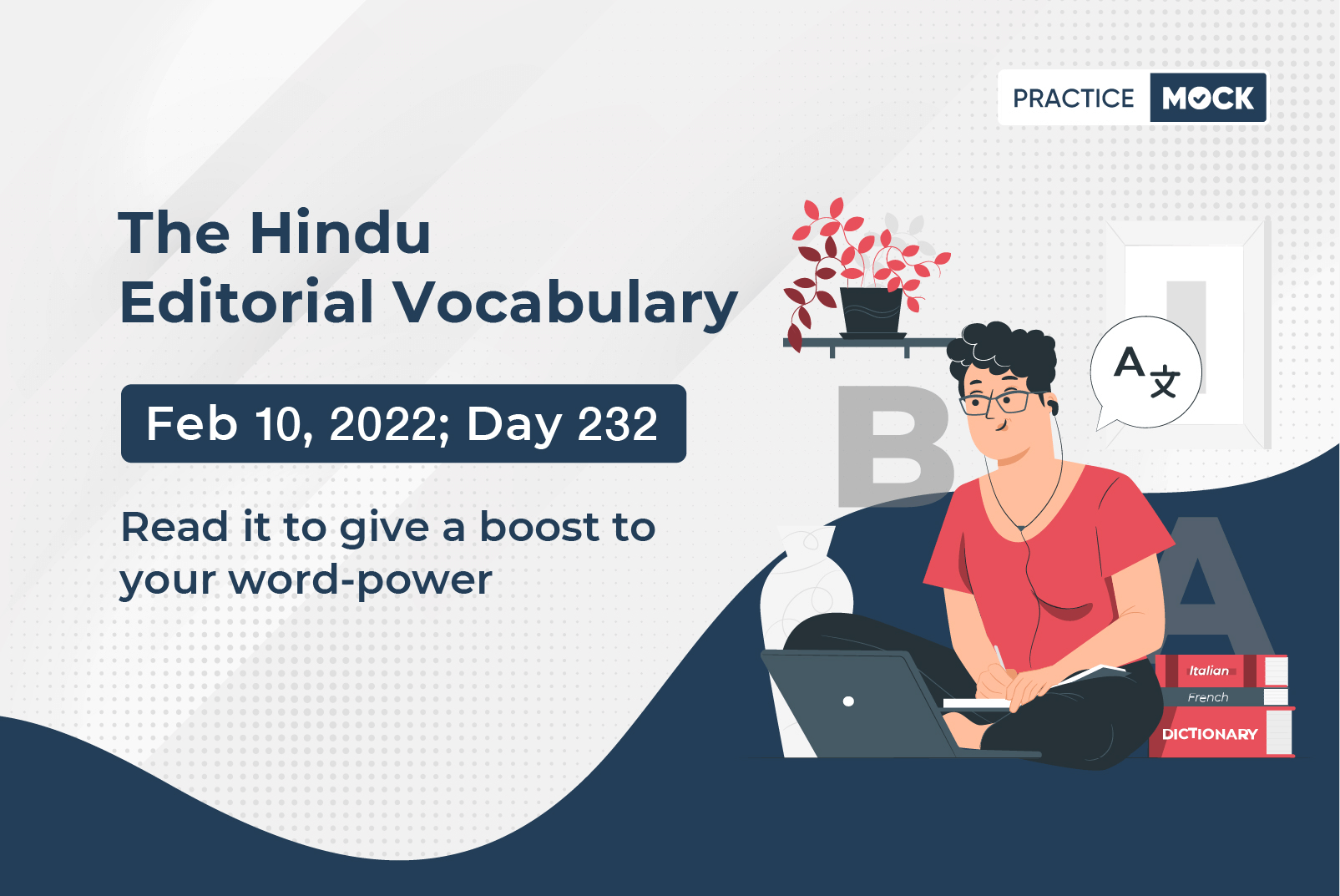In this blog you are going to about the about The Hindu Editorial Vocabulary– Feb 10, 2022; Day 232
| Difficult Word/ Phrase | Contextual Sense |
| Shuttle diplomacy | negotiations conducted by a mediator who travels between two or more parties that are reluctant to hold direct discussions |
| Convene | Meet formally |
| Separatist | Having separated or advocating separation from another entity or policy or attitude |
| Sweeping | wide in range |
| Roll back | The act of forcing the enemy to withdraw |
| Flank | The side of a military or naval formation |
| Lay bare | Make known to the public information that was previously known only to a few people or that was meant to be kept a secret |
| Bloc | A group of countries in special alliance |
| Assertion | A declaration that is made emphatically (as if no supporting evidence were necessary) |
| Appetite | a desire or liking for something |
The French format: On Macron’s shuttle diplomacy (negotiations conducted by a mediator who travels between two or more parties that are reluctant to hold direct discussions) between Russia and Ukraine
If Normandy Format talks could be convened (Meet formally), it would be a breakthrough for Russia, Ukraine
French President Emmanuel Macron’s shuttle diplomacy between Russia and Ukraine is one of the most significant interventions in the crisis ever since tensions started soaring in Eastern Europe. Mr. Macron, who has held talks with Russian leader Vladimir Putin in Moscow and Ukraine President Volodymyr Zelensky in Kiev, has said that both sides remain committed to the Minsk accords (2014-15), aimed at ending the violence between Ukraine and Russia-backed separatists (Having separated or advocating separation from another entity or policy or attitude) in the east; Mr. Putin assured him that Russia would not escalate the crisis. Put together, these statements offer a path towards calming the Russia-Ukraine tensions. Moscow has issued sweeping (wide in range) demands, including rolling back (The act of forcing the enemy to withdraw) NATO from Eastern Europe, which the West has rejected. But Russia’s key concerns are the growing NATO-Ukraine cooperation and the increasing western presence in the Black Sea. The U.S. had earlier offered dialogue on mutually reducing military drills in the eastern flank (The side of a military or naval formation) of Europe. And what Mr. Macron is trying to do now, through the Normandy Format talks (including France, Germany, Russia, Ukraine), is for a Moscow-Kiev dialogue based on the Minsk protocol, which, in theory, was accepted by both sides.
The crisis has also laid bare (Make known to the public information that was previously known only to a few people or that was meant to be kept a secret) the differences within the western bloc (A group of countries in special alliance) on how to deal with Russia. While the Biden administration has threatened to shut down Russia’s Nord Stream 2 pipeline in the event of a Russian invasion, the German leadership has been less specific in its response. Germany has barred Estonia, the tiny NATO member that shares a border with Russia, from supplying arms to Ukraine. Hungary’s Prime Minister Viktor Orbán, who met Mr. Putin in the Kremlin earlier this month, has said Russia’s demands were reasonable. Turkey’s Recep Tayyip Erdoğan, who visited Ukraine last week, has offered to host a peace summit. And now, Mr. Macron, who says the West “must respect Russia”, has already moved ahead. These varied responses, despite Joe Biden’s assertion (A declaration that is made emphatically (as if no supporting evidence were necessary)) of unity, show that Europe has less appetite (a desire or liking for something) for conflict with Russia. As a continent that experienced two disastrous World Wars and a Cold War, Europe understandably adopts pragmatic realism. But what needs to be seen is whether France and Germany have the diplomatic muscle to calm Russian nerves without making compromises on the continent’s security. A starting point could be reviving the Minsk process. The accords call for a general amnesty for the rebels, constitutional amendments giving the breakaway regions in eastern Ukraine more autonomy and the handing over of Ukraine’s borders to its army. None of the clauses in the agreement has been implemented. If the Normandy Format talks could be convened and Russia and Ukraine take steps to revive the agreement, it would be a diplomatic breakthrough.
Want to improve your vocabulary further? Download the Lists of Word-Meanings of Previous Months here.
- Sign Up on Practicemock for Updated Current Affairs, Free Topic Tests and Free Mini Mocks
- Sign Up Here to Download Free Study Material
Free Mock Tests for the Upcoming Exams
- IBPS PO Free Mock Test 2024
- RBI Grade B Free Mock Test 2024
- IBPS SO Free Mock Test 2024
- NABARD Grade A Free Mock Test 2024
- SSC CGL Free Mock Test 2024
- IBPS Clerk Free Mock Test 2024
- IBPS RRB PO Free Mock Test 2024
- IBPS RRB Clerk Free Mock Test 2024
- RRB NTPC Free Mock Test 2024
- SSC MTS Free Mock Test 2024
- SSC Strenographer Free Mock Test 2024
- GATE Mechanical Free Mock Test 2024
- GATE Civil Free Mock Test 2024
- RRB ALP Free Mock Test 2024
- SSC CPO Free Mock Test 2024
- AFCAT Free Mock Test 2024
- SEBI Grade A Free Mock Test 2024
- IFSCA Grade A Free Mock Test 2024
- RRB JE Free Mock Test 2024
- Free Banking Live Test
- Free SSC Live Test



